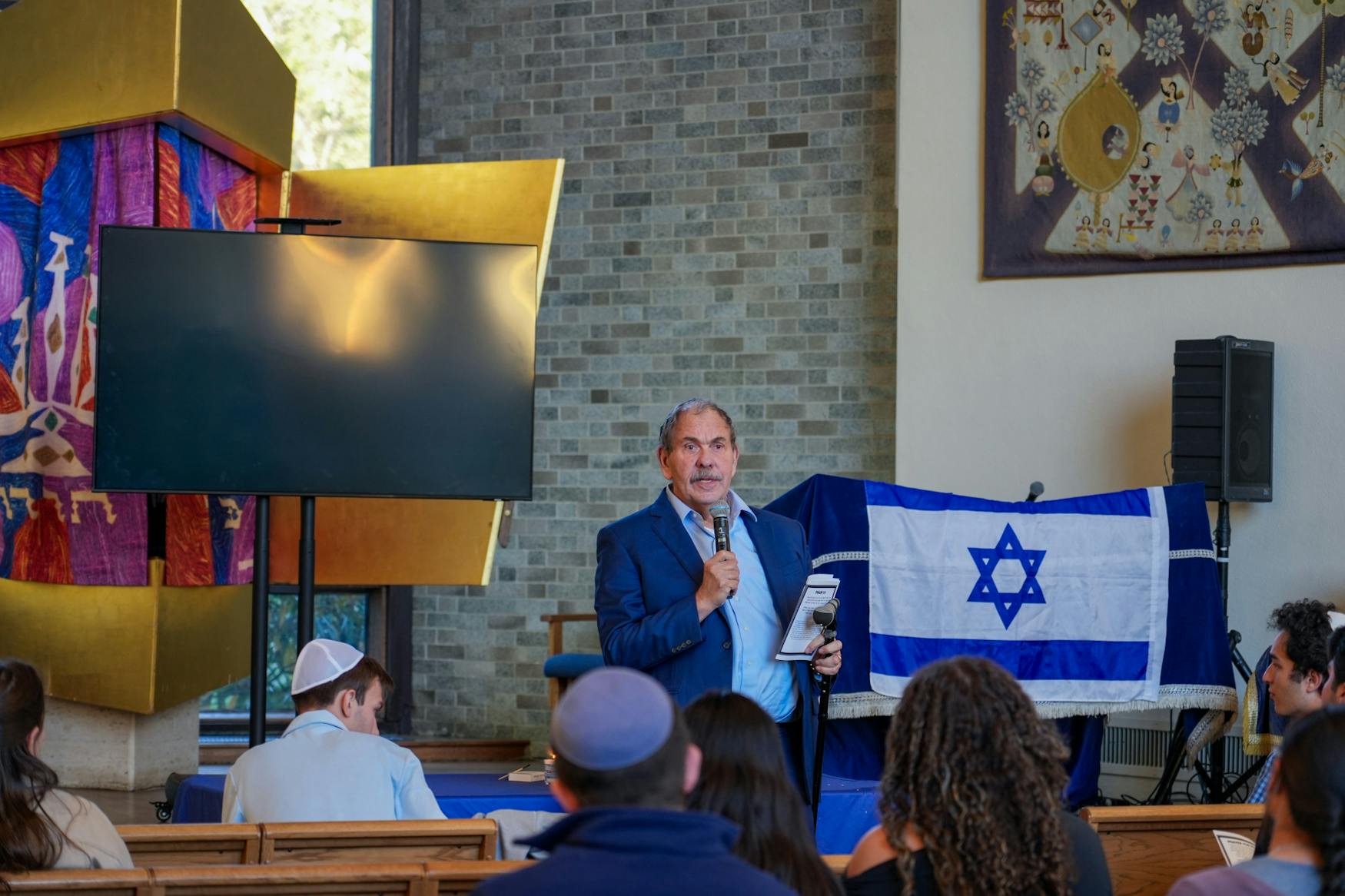Hillel hosts two year anniversary vigil for those who died in the October 7 attacks
An intimate service was held in Berlin Chapel where community members shared stories of the deceased.
On Oct. 9, Brandeis Hillel held a vigil for the victims of the attack in Israel on Oct. 7, 2023. The vigil, formatted as a service, was held in Berlin chapel. Between the accounts of community members who spoke about the lives of the deceased, a number of prayers were offered to honor the deceased. A screen at the front of the chapel displayed photos of victims of October 7.
The event, moderated by a student, opened on a note of hope: A ceasefire agreement had been reached, the release of the remaining hostages could be set into motion as soon as the next Shabbat.
Attendees then prayed in honor of the hostages, led by one of Hillel’s resident rabbis. A student then elucidated the impact of October 7, she emphasized how the war had changed what it was like to be Jewish on campus and the importance of creating spaces where Judaism feels alive. She also spoke on the significance of educating others and correcting misinformation.
Attendees were then led in Acheinu, a prayer for the safety and release of the hostages. Shortly after, University President Arthur Levine ’70 offered a prayer for peace, which emphasized the cession of war and bloodshed.
The next speaker spoke on behalf of Inbar Sherm Tov, whom they referred to as a loving and free-spirited young woman they had met on a trip to Israel. The two had hit it off, and continued a long-distance friendship up until Inbar’s death. The speaker described Inbar’s boundless love for the world around her, mentioning that she rescued dogs and had wanted to become a veterinarian in the future. According to him, the words “here is buried the girl of love” are inscribed on her tombstone. After Inbar was honored, attendants were led in Psalm 121, which is a psalm for religious ascents.
The next speaker told the story of the Tassa family, consisting of Gil Tassa, Sabine Tassa, Or Tassa, Zohar Tassa, Koren Tassa and Shai Tassa. The speaker recounted the events of the family’s home being invaded, including the killings of Gil, the father, and Or, the eldest son. Gil died in a grenade blast while protecting his family and Or was killed while at a nearby beach with his friends. Sabine, Zohar, Koren and Shai survived thanks to a safe room in their house, though they sustained injuries and were devastated by the loss of their two family members. Attendants were then led in Psalm 130 and then the Mourner’s Kaddish, a traditional Jewish prayer spoken in memory of the deceased.
The next community member honored Aviv Kotz, Rotem Kotz, Yiftach Kotz, Yoantan Kotz and Livnat Kotz. The family had fled the war in Ukraine and were living on Kibbutz Kfar in Southern Israel, which was attacked on October 7. The speaker described how the kibbutz had been raided by Hamas, narrating how parents on the kibbutz had been captured while children were left in the basement. All five members of the Kotz family were killed in their home. The speaker recalled that Aviv had been a civil engineer and Livnat a graphic designer. The two were happily married with sons Yoantan and Yiftach, who were growing a passion for basketball. After the Kotz family was honored, attendants were led in Mi Shebeirach for captured soldiers, a prayer for the safe return of Israel’s defense forces and Israeli hostages.
wThe next speaker focused on Eli Sharabi, who was taken hostage on October 7. Sharabi had been living on a kibbutz with his wife Lianne and two young daughters Noyla and Yahel. The speaker read aloud Sharabi’s firsthand account of his house being invaded and his kidnapping by Hamas. They described in detail that Sharabi had been held in an apartment, tied up for several months. According to the account, he and the other hostages experienced unbearable pain, and frequently resorted to begging in order to receive food and water. Through Sharabi’s account, the speaker described the inconsistent schedule and constant uncertainty of being a hostage, never knowing whether you will live to see the next day. Upon being freed after 491 days in captivity, Sharabi learned that Lianne, Noyla and Yahel had been killed.
After Sharabi’s story, attendees were again led in Mi Shebeirach for healing, a psalm calling for the renewal of mind and spirit, as well as a prayer for the strength and protection of Israel. There was then a moment of silence.
The event ended with singing the Hatikvah, Israel’s national anthem. The student moderator invited attendees to light a candle on behalf of the victims on their way out of the chapel.
The vigil’s pamphlet, which was handed out to all participants, invited attendees to join the Brandeis Israel Public Affairs Committee for an event with survivor Rom El-Hai to take place at 7:30 p.m. the same day. Additionally, the pamphlet announced a special exhibition in the Gluck Lobby entitled “10/7: Human Stories” to be displayed until the end of Simchat Torah.
— Editors’ Note: Copy Editor Rivka Resnick ’27 is a member of Hillel and did not contribute to nor edit this article.
— Editors' Note: Associate Editor Bryan Wolfe ’27 and Associate Editor Xilei Ceci Chen ’26 are Hillel photographers and did not edit or contribute to this article.



Please note All comments are eligible for publication in The Justice.